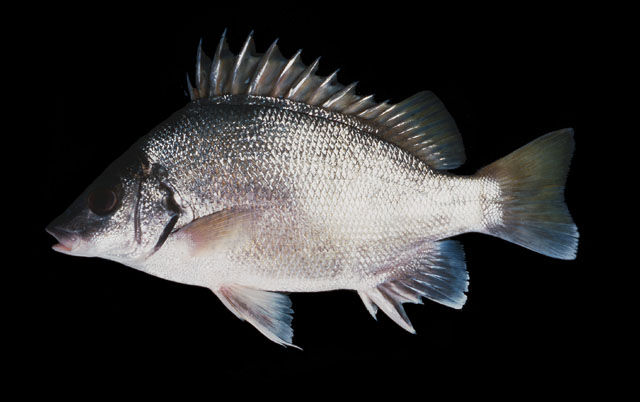Silver Grunter, Mesopristes argenteus (Cuvier 1829)

A Silver Grunter, Mesopristes argenteus, from Manado, Celebes, Indonesia. Source: John E. Randall / Fishbase via EOL . License: CC BY Attribution-NonCommercial
Inhabits coastal marine waters, often around mangroves. Juveniles also enter brackish waters and the lower freshwater parts of creeks and rivers.
Identifying features:
Ventral profile of body straight, forehead straight and steeply angled;
Dorsal and anal fin spines very long;
Overall silvery-grey, darker above than below, usually clear or yellowish fins, although anal and caudal fins may be dusky;
Juveniles with 4 distinct black stripes along sides.
Silver Grunter, Mesopristes argenteus (Cuvier 1829)
More Info
|
Distribution |
In Australia from Cape Tribulation to Townsville, Cape York, Queensland. Elsewhere, the species is widespread in the tropical, west Pacific - from Indonesia, East Timor and the Philippines, north to the Ryukyu Islands, Japan, south to Australia, and east to East Papua New Guinea, Vanuatu and the Solomon Islands. Mostly inhabits coastal marine waters, often amongst mangroves. Juveniles enter estuaries and the lower freshwater parts of rivers as juveniles. |
|
Features |
Dorsal-fin spines/rays: XII, 10-11 Anal-fin spines/rays: III, 8-9 Pelvic-fin spines/rays: I, 5 |
|
Feeding |
Omnivore |
|
Biology |
Females spawn demersal eggs that are guarded by the male. |
|
Fisheries |
Of minor commercial importance in some areas. |
|
Conservation |
|
|
Species Citation |
Datnia argentea Cuvier, 1829, Histoire Naturelle des Poissons 3:139. Type locality: Java. |
|
Author |
Bray, D.J. 2018 |
|
Resources |
Silver Grunter, Mesopristes argenteus (Cuvier 1829)
References
Allen, G.R. 1991. Field Guide to the Freshwater Fishes of New Guinea. Madang : Christensen Research Institute 268 pp.
Allen, G.R. & Coates, D. 1990. An ichthyological survey of the Sepik River, Papua New Guinea. Records of the Western Australian Museum, Supplement 34: 31-116
Allen, G.R., Midgley, S.H. & Allen, M. 2002. Field Guide to the Freshwater Fishes of Australia. Perth : Western Australian Museum 394 pp.
Cousins, S., Kennard, M.J. & Ebner, B.C. 2017. Depth-related composition and structuring of tropical riverine fish assemblages revealed by baited video. Marine and Freshwater Research 68: 1965-1975. https://doi.org/10.1071/MF16278 abstract
Cuvier, G.L. in Cuvier, G.L. & Valenciennes, A. 1829. Histoire Naturelle des Poissons. Paris : Levrault Vol. 3 500 pp., pls 41-71.
Davis, A.M. & Betancur-R.R. 2017 Widespread ecomorphological convergence in multiple fish families spanning the marine – freshwater interface. Proceedings of the . R. Soc. B 284: 20170565. http://dx.doi.org/10.1098/rspb.2017.0565
Davis, A.M., Unmack, P.J., Pusey, B.J., Pearson, R.G. & Morgan, D.L. 2013. Ontogenetic development of intestinal length and relationships to diet in an Australasian fish family (Terapontidae). BMC Evolutionary Biology 13: 53, 16 pp.
De Vis, C.W. 1884. New Australian fishes in the Queensland Museum. Proceedings of the Linnean Society of New South Wales 1 9(2): 389-400 (as Therapon acutirostris)
Grant, E.M. 1975. Guide to Fishes. Brisbane : Queensland Government, Co-ordinator General’s Department 640 pp.
Grant, E.M. 2002. Guide to Fishes. Redcliffe : EM Grant Pty Ltd 880 pp.
Macleay, W.J. 1883. Contribution to the knowledge of the fishes of New Guinea. No. 4. Proceedings of the Linnean Society of New South Wales 1 8(2): 252-280 (p.258 as Therapon nasutus, p.260 as Therapon chalybeus)
Hoese, D. 2012. Mesopristes argenteus. The IUCN Red List of Threatened Species 2012: e.T196447A2457965. http://dx.doi.org/10.2305/IUCN.UK.2012.RLTS.T196447A2457965.en. Downloaded on 03 October 2018.
Kottelat, M., A.J. Whitten, S.N. Kartikasari & S. Wirjoatmodjo. 1993. Freshwater fishes of Western Indonesia and Sulawesi. Periplus Editions, Hong Kong. 221 p.
Larson, H.K. & Pidgeon, B. 2004. New records of freshwater fishes from East Timor. The Beagle, Records of the Museums and Art Galleries of the Northern Territory 20: 195-198.
Vari, R.P. 1978. The terapon perches (Percoidei, Terapontidae) a cladistic analysis and taxonomic revision. Bulletin of the American Museum of Natural History 159(5): 175-340 figs 1-94
Vari, R.P. 2001. Family Terapontidae. pp. 3305-3316 in Carpenter, K.E. & Niem, V.H. (eds). The Living Marine Resources of the Western Central Pacific. FAO Species Identification Guide for Fisheries Purposes. Rome : FAO Vol. 5 2791-3379 pp.
Whitley, G.P. 1943. Ichthyological notes and illustrations. Part 2. The Australian Zoologist 10(2): 167-187 figs 1-10
Yoshino, T., H. Yoshigou, H. & Senou, H. 2002. Mesopristes iravi, a new terapontid fish (Perciformes: Terapontidae) from rivers of Iriomote Island, the Ryukyu Islands. Ichthyological Research 49(3): 234-239.



